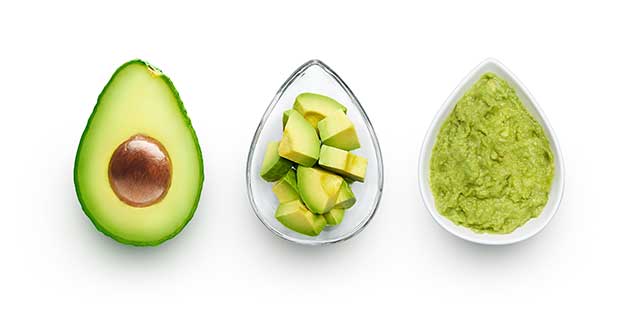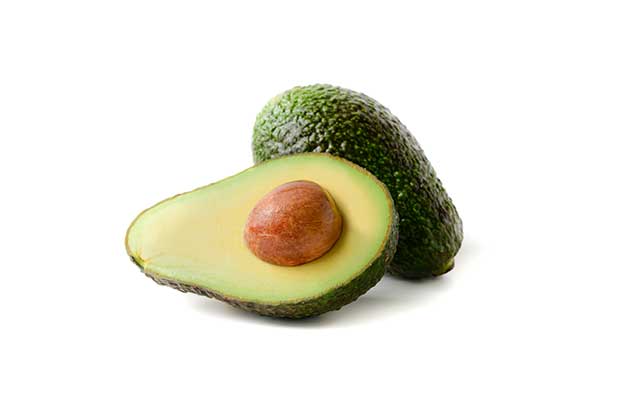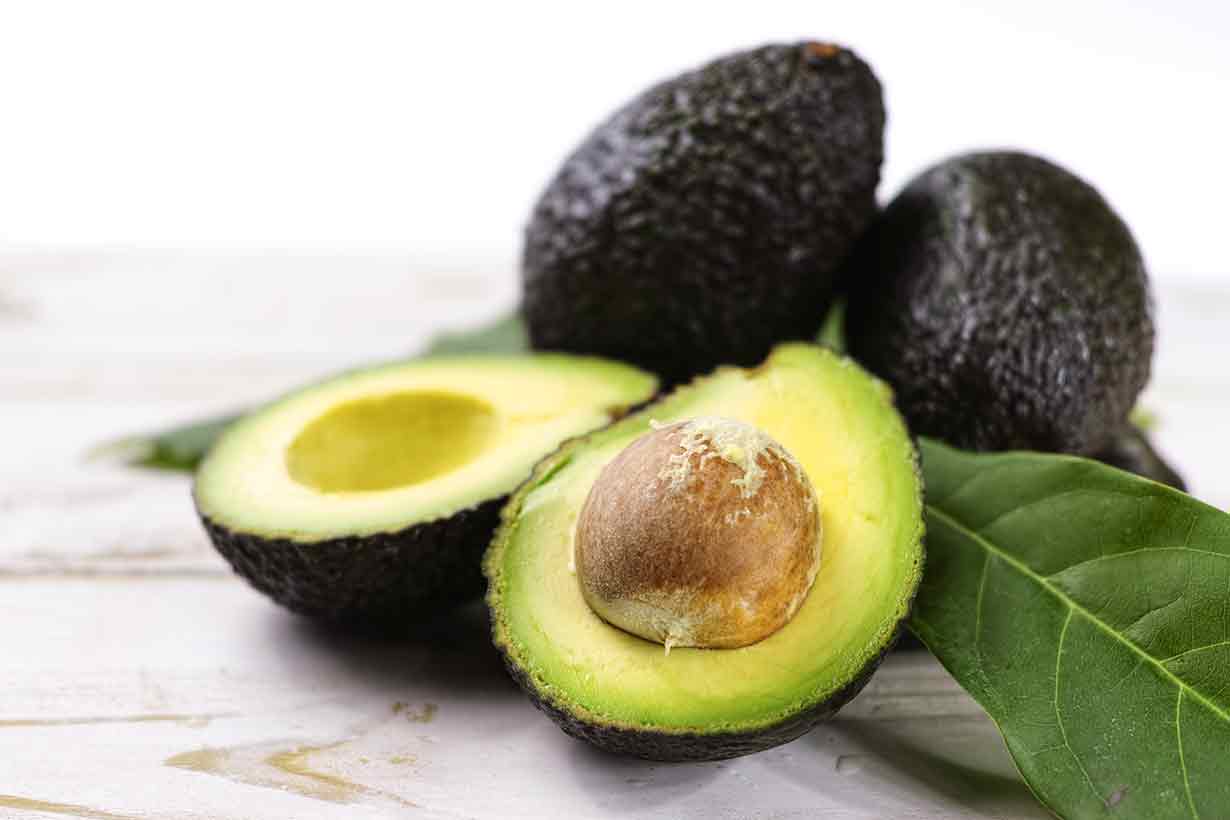Avocados are a delicious fruit that likely originated in Central Mexico.
Surprisingly, avocados are a berry in botanical terms. However, they have their own unique taste, which is dissimilar to other fruit.
Unlike most other types of fruit, the avocado is primarily a source of fat, and it has a soft and creamy texture.
In this article, we take a look at some of the impressive health benefits avocado offers.

1) Avocados Are a Rich Source of Potassium
Avocado is an excellent source of potassium. One avocado provides 975 mg of the mineral, which accounts for 28% of the recommended potassium intake (1).
When most people think about potassium-rich foods, bananas come to mind.
However, one medium banana only contains 422 mg of potassium, which is less than half of the potassium content in one avocado (2).
Potassium is an essential mineral that plays a vital role in blood pressure regulation, muscular contraction, and bone health (3).
Unfortunately, potassium insufficiency is prevalent around the world, and studies suggest that only 3% of Americans have an adequate intake (4).
As a result, an avocado is an excellent way to improve potassium intake.
2) Full of Healthy Fats
Avocados are a rich source of dietary fat, and one avocado offers 29.5 grams of total fat.
The majority of the fat in avocado is monounsaturated fat in the form of oleic acid. The ratio of fatty acids in the fruit is as shown below (1);
- Saturated fat: 4.3 grams (15.5%)
- Monounsaturated fat: 19.7 grams (71.1%)
- Polyunsaturated fat: 3.7 grams (13.4%)
Among the monounsaturated fat content, more than 18 grams of this is oleic acid, which is the main fatty acid in both avocados and olives.
Research on oleic acid suggests that it may have beneficial effects on the lipid profile, insulin sensitivity, and other markers of metabolic syndrome (5, 6, 7).
In addition to the potential benefits, the fat content of avocado helps to give it a deliciously creamy and buttery texture.
3) Avocados Have a High Fiber Content
A typical avocado contains around 17 grams of carbohydrate, and more than 13 grams of this carbohydrate content is fiber.
While many people think of grains as the best source of fiber, avocados are one of the most fiber-rich foods in the human diet.
For instance, the following table shows how avocado compares to some other fiber-rich foods (1, 8, 9, 10);
| Type of Food | Fiber Content |
|---|---|
| 1 Avocado | 13.5 g |
| 1 Cup of Brown Rice | 3.5 g |
| 3 Slices of Whole Wheat Bread | 8.4 g |
| 1 Cup of Rolled Oats | 8.2 g |
As shown, based on realistic portion sizes, avocado offers more fiber than whole grains.
Dietary fiber can reduce the glycemic response to carbohydrate-containing foods, which can help to lower postprandial blood-sugar levels (11).
Furthermore, research suggests that dietary fiber may have benefits for the gut microbiome since it is a food source for the bacteria in our gut (12).
4) Avocado Is Low In “Net Carbs”
As just discussed, the majority of the carbohydrate in avocado is fiber. For this reason, the fruit is very low in “net” (digestible) carbohydrate.
In other words; since there are only 3.6 grams of non-fiber carbohydrate in avocado, there is minimal carbohydrate that breaks down into glucose (1).
Therefore, avocado will have a minimal impact on blood sugar levels. This fact makes avocado an excellent choice for anyone watching their blood sugar levels.
For example, avocado is an excellent fit for lower-carb diets.
Additionally, studies show that adding avocado to a meal significantly reduces the glycemic response to that meal (13).
5) Versatility: There Are So Many Different Ways To Use Avocado
While most of the benefits of avocado are health-related, the fruit is also one of the most versatile food choices.
There are many different ways to use avocado and some of these include;
- As a dip: we can make a wide variety of avocado-based dips by merely mashing a ripe avocado and adding additional ingredients.
- In cooking: although most people eat avocado raw, we can also roast it or use it as an ingredient in various cooked dishes. Whether raw or cooked, avocado tastes delicious.
- Spread/filling: Some people enjoy to use avocado as a spread on toast or as a filling for baked potatoes.
- Smoothies: In addition to extra nutrients, using avocado in a smoothie can provide some healthy fats and a thicker texture.
- Alone: Avocado tastes great on its own or with a little bit of salt.
- Guacamole: The Mexican side dish guacamole is one of the most popular condiments in the world, and avocado is the primary ingredient.
6) Rich In Antioxidants
Avocado is an excellent source of antioxidant vitamins A, C, and E.
While the fruit is not particularly high in vitamin A, it offers 33% of the recommended daily intake for vitamin C and 21% for vitamin E (1).
For vitamin A, avocado offers a more modest amount, but the fruit provides a source of the carotenoids lutein and astaxanthin. According to studies, these compounds play a beneficial role in maintaining and protecting our eyesight (14).
For this reason, avocado consumption may have potential benefits for our eyesight (15).
The primary function of vitamins C and E in the body are to protect against oxidative stress (16, 17).
Vitamin C may also regenerate the oxidized form of vitamin E, thereby improving the antioxidant’s efficacy (18, 19).
7) Avocado May Improve Satiety Levels (and Thereby Encourage Weight Loss)

Interestingly, some research suggests that meals containing avocado are more satisfying and have a positive impact on satiety.
In one randomized study featuring twenty-six overweight adults, incorporating half of an avocado in lunch meals had a beneficial effect on satiety (20).
Over the 3-5 hour post-lunch period, those who had the avocado-containing lunch had a lower subsequent food intake of approximately 83 calories.
Additionally, surveys demonstrated that the participants consuming the avocado lunch had a 23% increased satisfaction level after the meal and a 23% decreased desire to eat.
In a further randomized clinical trial, replacing carbohydrate with whole avocado in a high-carbohydrate meal led to higher feelings of satiety (21).
The researchers explained these higher satiety levels were due to avocado causing an elevation in peptide YY and GLP-1, which are both hormones with satiety-enhancing effects (22).
8) May Reduce Triglyceride and LDL-Cholesterol Levels
Numerous studies show that avocado consumption may lower fasting triglyceride, LDL-C, LDL-P, and non-HDL cholesterol levels (23, 24, 25).
Since avocado tends to reduce triglycerides and non-HDL particles without affecting HDL levels, it should theoretically reduce cardiovascular risk.
For instance, both the triglyceride to HDL ratio and the ratio of HDL to non-HDL are thought to be two of the most accurate measures of cardiovascular risk (26, 27).
These studies show that one avocado per day is enough to have these effects, which is a realistic portion size.
9) Boosts the Absorption of Fat-Soluble Vitamins
Since vitamins A, E, and K are fat-soluble vitamins, the high fat content of avocado should help with the optimal absorption of these nutrients (28).
Additionally, avocado should help with the digestion of fat-soluble vitamins from other food sources (29).
The human body absorbs fat-soluble vitamins—A, D, E, and K—in the intestine, but sufficient levels of fat need to be present for optimal absorption (30).
There are nearly 30 grams of fat in one avocado.
10) Avocado Can Improve Markers of Metabolic Syndrome
As previously mentioned, avocado may help to improve several markers of metabolic syndrome including;
- Cholesterol levels
- Blood pressure
- Blood sugar levels
The fruit may also help to encourage weight loss via its effect on satiety levels.
To summarize the data on avocado as a potential treatment for metabolic syndrome, a recent systematic review analyzed the totality of observational research, animal studies, and human clinical trials (31).
On the positive side, the systematic review found that the existing evidence supports the use of avocado to treat different components of metabolic syndrome.
Among these different components, avocado consumption had the most significant effect on the lipid (cholesterol) profile.
11) Avocado Offers An Impressive Nutrition Profile
As we have seen, avocado is a fruit that offers a variety of beneficial nutrients from healthy fats and fiber to antioxidant vitamins and essential minerals.
The following tables present the the full nutritional values for one avocado fruit (201g) (32):
| Calories/Nutrient | Amount |
|---|---|
| Calories | 322 kcal |
| Carbohydrate | 17.1 g |
| Fiber | 13.5 g |
| Sugars | 1.3 g |
| Fat | 29.5 g |
| Saturated Fat | 4.3 g |
| Monounsaturated Fat | 19.7 g |
| Polyunsaturated Fat | 3.7 g |
| Omega-3 Fatty Acids | 221 mg |
| Omega-6 Fatty Acids | 3396 mg |
| Vitamin | Amount | % DV |
|---|---|---|
| Vitamin K1 | 42.2 mcg | 53 % |
| Folate | 163 mcg | 41 % |
| Vitamin C | 20.1 mg | 33 % |
| Pantothenic Acid (B5) | 2.8 mg | 28 % |
| Pyridoxine (B6) | 0.5 mg | 26 % |
| Vitamin E | 4.2 mg | 21 % |
| Niacin (B3) | 3.5 mg | 17 % |
| Riboflavin (B2) | 0.3 mg | 15 % |
| Thiamin (B1) | 0.1 mg | 9 % |
| Vitamin A | 14.1 mcg RAE | 1.6 % |
| Mineral | Amount | % DV |
|---|---|---|
| Potassium | 975 mg | 28 % |
| Copper | 0.4 mg | 19 % |
| Magnesium | 58.3 mg | 15 % |
| Manganese | 0.3 mg | 14 % |
| Phosphorus | 105 mg | 10 % |
| Zinc | 1.3 mg | 9 % |
| Iron | 1.1 mg | 6 % |
| Calcium | 24.1 mg | 2 % |
| Selenium | 0.8 mcg | 1 % |
| Sodium | 14.1 mg | 1 % |
As shown in the tables, avocado provides a wide range of essential vitamins and minerals.
Among these nutrients, it is particularly high in potassium, copper, magnesium, vitamin C, vitamin K, and the B vitamins.
Final Thoughts
Similar to all foods, there is nothing about avocado that makes it an essential part of our diet.
That said, this fruit contains such a wide variety of beneficial nutrients that it can contribute a lot to the average diet—and it’s why it makes our list of healthiest foods.
With large amounts of healthy fat, fiber, vitamins, and minerals, avocado offers a lot of health-promoting nutrients.
As a bonus, it is a versatile ingredient that we can use in many different ways, and it tastes delicious.








